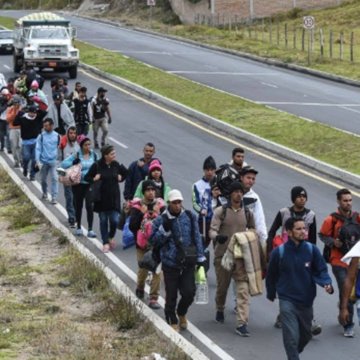- About
- Topics
- Picks
- Audio
- Story
- In-Depth
- Opinion
- News
- Donate
- Signup for our newsletterOur Editors' Best Picks.Send
Read, Debate: Engage.
| located: | Venezuela, Colombia |
|---|---|
| editor: | Magdalena Rojo |
Imagine if the price of your cup of coffee would rise 144,637 percent in a year's time. This is the picture of hyper-inflation in current Venezuela. Yet, coffee is not a concern of the locals when people simply cannot afford to buy basic toiletries or food.
The shortages of medicine are now so severe that mothers together with their children are desperate to cross borders to Colombia. And with them, tens of thousands of people are crossing every day. Official numbers of the UNHCR state that there are 3.7 million Venezuelans around the world at the moment. By the end of 2018 about 460,000 people asked for asylum in countries across the Americas.
In the recently published guidance note, the UNHCR calls on international protection for Venezuelans as the country remains in chaos, and many people are fleeing to save their lives. The Venezuelan humanitarian crisis has caused the biggest migratory move in the modern history of Latin America.
Since November 2018, Colombia has been hosting more then one million refugees. The bordering country opened up its doors for fleeing Venezuelans and has been providing medical support, with many children attending local primary schools, and hundreds of thousands of given jobs. At the beginning of the crisis, the Colombian government was helping Venezuelans on all fronts, yet the masses that are crossing its borders are bigger than expected. Colombia together with Peru, which hosts the second highest numbers of Venezuelans, are calling for international assistance in providing aid.
They say those with the wider shoulders carry the heavier load. This saying is not necessarily true in the case of the distribution of people searching refuge around the world.
Countries like Jordan, Turkey, Lebanon, and even Uganda and Kenya are in the group of states taking care of the highest numbers of refugees. And now, Colombia is in the club, too. Yet, the capacities of its medical centres, shelters, and schools are limited and those limitations are starting to show.
UNHCR is urging Latin American states not to deport undocumented migrants and refugees back to Venezuela. However, there should be an urge towards the international community to lend a hand, too.
